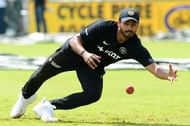Emphasis on Indian players
It goes without saying that there was a clear emphasis to get a lot of good Indian players in the auction this year.
This may be due to the fact that Indian players may be best suited to home conditions and at the end of the day, franchises can only go in with four foreign players in their teams. It has been historically seen that the franchises with the best Indian bench-strength ultimately come out stronger.
During the last three auctions, there has been a marked shift from the franchises to acquire the services of more uncapped Indian players. The Rajasthan Royals under Shane Warne had won the maiden title depending on the services of young Indian talents.
And that is what the IPL is about -- if it can give a platform to young, uncut diamonds and nurture them from the grassroots level, there is nothing like it.
But it would perhaps be too outrageous to claim that the big corporates owning the franchises are solely motivated by the purpose of philanthropy -- the development of young, Indian talents at the cost of team performance.
Because, the IPL, at the end of the day, is a business like any other and it is massively unprofitable for a franchise to perform poorly even if it develops talents in the process.
The claim of a franchise member that young, Indian players were being bought early to turn them into future stars like in the multi-million dollar world of European club football also does not hold water.
Most European football clubs do not splurge the cash on young and absolutely untested players - as the IPL has done in the auction - with an eye on developing them.
Very young players very often sign for prestigious football academies with a view of developing them in the near future. Until then, of course, they play for the youth teams of the club and very few among them eventually make the cut.
The IPL franchises, of course, do not have such a system for developing young talents for an extended period of time. Even when young players are bought at great sums of money, the pressure is to start performing immediately.
If they don't, they are released for the auction by the franchises soon. Seldom do franchises hold on to expensive, underperforming young players in the expectation that they might perform better in the future.
Bidding psychology and brand value
The obvious reason why some big international stars went unsold in the auction this year is because franchises felt it would be better to splurge the cash on young Indian players. But the hefty prices some of these players attracted have raised questions about whether they deserve such huge contracts.
Take the case of Pawan Negi for instance. Emerging as the third spinner- who could also be a destructive lower-order batsman- for CSK last season, Negi in many ways exceeded expectations. But that raises the question: Does Negi indeed deserve to have a price tag of Rs. 8.5 crores?
This interestingly can be explained by taking a cursory glance at bidding psychology. A lot of noted academic research done on the subject has revealed that overbidding is a reality because bidding is related to the notion of pride and an injured ego.
In other words, one can end up overbidding for a product because s/he cannot bear the consequences of losing out on a bid, or the happiness and feeling of triumph associated with winning a bid.
Thus, franchises might have come with a fluid list of players they wanted. But they might have ended up overbidding just because they could not bear the feeling of losing out to a rival faction.
And this is pretty much how the bidding happens in the IPL -- every franchise is circumspect to launch the first bid which is why a lot of good players go unsold. But when the bidding begins, it turns into a full-scale war of egos.
The other notion is of the necessity of the IPL franchises to build their unique brand values around young Indian stars.
The world of European clubs have taught us well the recent idea of dishing out huge money to a new young player to turn him into a star overnight. The shirt sales soar instantly and the player becomes a symbol of one's unique brand identity.
In the world of IPL, commerce and economics are as important as the sport. This is exactly why a dashing bits-and-pieces cricketer like Negi or a Deepak Hooda will also hog the limelight ahead of the more technically correct and useful Cheteshwar Pujara.
In IPLonomics, Pujara has no brand value and does not sell well.
Talent or corruption?
But what sort of a madness is it, you still need to ask, to pay above INR 4 crores for the likes of Murugan Ashwin and Deepak Hooda? The IPL has had a history of lavishing money on youngsters and then dumping them unceremoniously when they failed to perform.
The question becomes even more serious when you consider the fact that despite being in the limelight of late, Hardik Pandya did not make as much news at the auction as his elder brother Krunal Pandya.
Krunal is yet to make his first-class debut and has not played since March 2015 because of a prolonged phase of injury. He still managed to bag an INR 2 crore contract with the Mumbai Indians.
The nature of some of these acquisitions seems to be even more suspicious when you consider the fact that some of these players have done well only in state-best local T20 leagues.
Kishore Kamnath, a relatively unknown figure who was bought for Rs. 1.4 crores by the Mumbai Indians only has a good record in the Karnataka Premier League (KPL) to show for himself.
The last time a player from the KPL made news was when KC Cariappa was bought for a whopping Rs. 2.4 crores by the KKR in last year's auction. Cariappa played a single match and was released by the KKR this year.
When you closely consider the facts, one detail that does not fail to catch our attention is the fact that AR Srikkanth, the team analyst for the KKR also has the same role for the Bijapur Bulls, the franchise Cariappa plays for in the KPL.
Was it an innocent recommendation based on a young boy's outrageous talent, something we missed out on in the two overs that Cariappa bowled? Why was he not given a fair chance if the franchise thought he was worth INR 2.4 crores in the first place?
The world of IPL is a shady world of murky glitz and unhand dealings. Would it be wrong if instances such as these set tongues wagging?
Get real-time updates on IPL 2025, live scores, IPL Prediction, match schedule, points table,Result & squad -CSK, MI, RCB, KKR, SRH, LSG, DC, GT, PBKS


